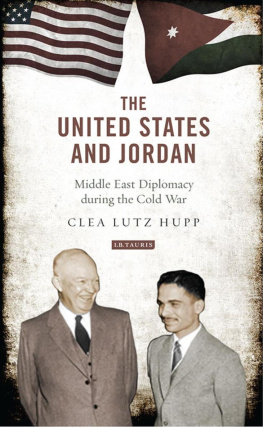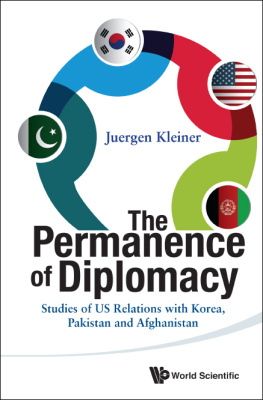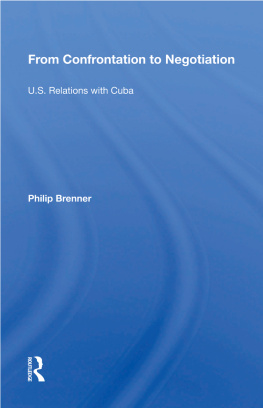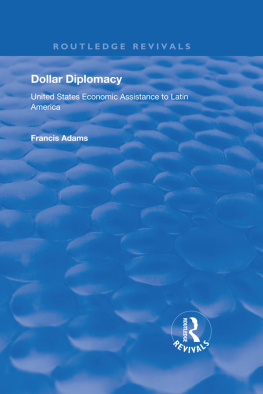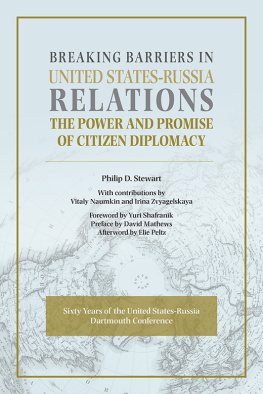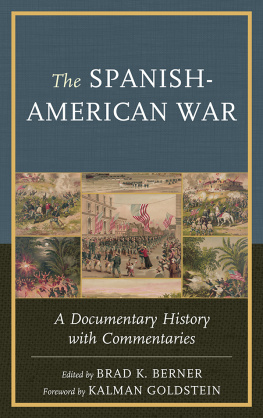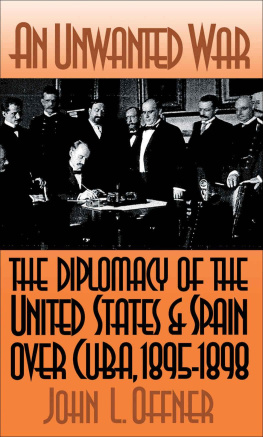French Ensor Chadwick - The Relations of the United States and Spain: Diplomacy
Here you can read online French Ensor Chadwick - The Relations of the United States and Spain: Diplomacy full text of the book (entire story) in english for free. Download pdf and epub, get meaning, cover and reviews about this ebook. year: 2012, publisher: Barnes & Noble, genre: Science. Description of the work, (preface) as well as reviews are available. Best literature library LitArk.com created for fans of good reading and offers a wide selection of genres:
Romance novel
Science fiction
Adventure
Detective
Science
History
Home and family
Prose
Art
Politics
Computer
Non-fiction
Religion
Business
Children
Humor
Choose a favorite category and find really read worthwhile books. Enjoy immersion in the world of imagination, feel the emotions of the characters or learn something new for yourself, make an fascinating discovery.
- Book:The Relations of the United States and Spain: Diplomacy
- Author:
- Publisher:Barnes & Noble
- Genre:
- Year:2012
- Rating:3 / 5
- Favourites:Add to favourites
- Your mark:
- 60
- 1
- 2
- 3
- 4
- 5
The Relations of the United States and Spain: Diplomacy: summary, description and annotation
We offer to read an annotation, description, summary or preface (depends on what the author of the book "The Relations of the United States and Spain: Diplomacy" wrote himself). If you haven't found the necessary information about the book — write in the comments, we will try to find it.
Published in 1909, this volume of Relations of the United States and Spain is Rear Admiral Chadwicks thoughtful, thorough, and insightful study of the causes of the 1898 war between the United States and Spain with special emphasis on the uses of diplomacy in the preceding one hundred years of racial and political strife.
The Relations of the United States and Spain: Diplomacy — read online for free the complete book (whole text) full work
Below is the text of the book, divided by pages. System saving the place of the last page read, allows you to conveniently read the book "The Relations of the United States and Spain: Diplomacy" online for free, without having to search again every time where you left off. Put a bookmark, and you can go to the page where you finished reading at any time.
Font size:
Interval:
Bookmark:
FRENCH ENSOR CHADWICK

This 2012 edition published by Barnes & Noble, Inc.
All rights reserved. No part of this publication may be reproduced, stored in a retrieval system, or transmitted, in any form or by any means, electronic, mechanical, photocopying, recording, or otherwise, without prior written permission from the publisher.
Barnes & Noble, Inc.
122 Fifth Avenue
New York, NY 10011
ISBN: 978-1-4114-5992-2
INTRODUCTION
T HIS book is the outcome of a study of the causes of the war of 1898 between the United States and Spain. Beginning as a preliminary chapter of the war, it was soon found that these causes were of such long growth and of such intricate character that it was vain to hope to bring them into short compass. The attempt at compression was abandoned and the book is thus an effort to bring before the reader the story of more than a hundred years of what has been really a racial strife; on the part of one race for actual domination over regions in which apparently it could not brook a division of rule; on the part of the other for the preservation of the statusquo.
The late war was thus but the culmination of difficulties which had their seed in the peace of 1763. They sprung into life twenty years later with the advent on the world's stage of the American Union; remained in full vigor for half a century thereafter with scarcely an interval of repose, and waxed and waned for seventy-five years more, until finally war came in 1898 to remove the last cause of friction. Few of the 115 years from 1783 to 1898 were free from bitterness of feeling. The war was thus but a final episode in a century of diplomatic ill-feeling, sometimes dormant but more often dangerously acute.
One of the races involved is essentially practical, untrammeled by the conventions and conservatism natural to an old civilization; protestant in the large sense of ignoring generally the ways of the past, and with its natural and racial protestantism accentuated by a democratic development of nearly three hundred years. The other, offspring of all the ancient races of the Mediterranean, was in the grip of antiquity, with the inherited traits of the most ancient civilizations of the Mediterranean world and naturally antagonistic in all its ways of thought and action to a people which, from its point of view, was an upstart without traditions; whose ancestors were barbarians when of literature, art and law Spain had possessed for a thousand years all that the ancient world had to give.
But it was more than antiquity, more than an old civilization, which produced the differences which made it impossible for the North American Anglo-Saxon to live near his Spanish neighbor without friction. The chief cause was in the absolute racial unlikeness itself, and though racial differences are somewhat modified by more modern conditions, the basis of this unlikeness, this racial temperament, still has an influence over the relations of men, immeasureable in degree, and more potent, though so intangible, than any other force in humanity.
Of the many races which have gone to make up the varying type of men in the Spanish Peninsula, the early Afro-Semitic and the Saracen have made the strongest impress upon the national character, and have given it mainly its qualities, good and bad; its tribal tendencies, its artistic temperament, its courtesy, its fanaticism, its fatalism, its gloomy pride and conservatism, and, not least, its cruelty. For the Iberian, the earliest known occupant of the Peninsula, was a Semite, and we have today his counterpart in the men of the Kabyl tribes of the Atlas. Says one who of Anglo-Saxons perhaps knows best the Spanish people: "Not alone in physique do these tribes resemble what the early Iberian must have been, but in the more unchanging peculiarities of character and institutions the likeness is easily traceable to the Spaniards of today.... The village granary (posito) still stands in the Spanish village as its counterpart does in the Atlas regions; the town pasture and communal tillage land continue on both sides of the straits to testify to the close relationship of the early Iberians with the Afro-Semitic races, which included the Egyptian or Copt, the Kabyl, the Touareg, and the Berber. The language of the Iberian has been lost, but enough of it remains on the coins of the later Celtiberian period to prove that it had a common root with the Egyptian and Saharan tongues, which extend from Senegal to Nubia on the hither side of the negro zone."
Wave after wave of Semitic blood added itself to the kindred strain of the original Iberian. The Phnician came for six hundred years and he again was followed and displaced by his near relative, the Carthagenian, who was dominant in all the coasts of the land for two hundred and fifty more, when their power sank in the final defeat of Hannibal and in the victory of Scipio Africanus, 202 years before Christ. Cadiz, the last stronghold of Carthagenian power, was then abandoned and Rome ruled the land as long as there was Roman power.
In the north the Celt had preceded the Phnician, and Goth and Vandal and Visigoth had followed the Roman and left marked traces; but all the varied races of the Peninsula were engulfed 300 years after the downfall of the Romans by the last and greatest of the historic invasions from Africa (A. D. 711) when Arab and Berber began a conquest which was for a time to include all Spain, and was to hold its fairest provinces for a longer period than any other race within man's knowledge. Islam did not rule the greater part of Spain for 500 years and these fairest provinces 300 years longer without leaving more than a memory. It made a deep impress on the blood as well as the thought and history of Spain, and, added to the Iberian-Phnician-Carthagenian strain, accentuated the already strong Semitic qualities of the race, and made the man of the Peninsula closely akin in temperament and mental qualities to the Oriental and very different even from his closest neighbor north of the Pyrenees. During the most of this period, nearly as long as from the conquest of England by the Norman to the present day, the Moor-Berber was the dominant race, physically and intellectually, and after the last remnant of their dominion had passed there continued to live in Spain, subject to the Spanish Christians, a host of men of Moorish blood, a great portion of whom became merged into what came to be known only four centuries since as the Spanish nation.
It is clearly impossible that the great Moorish power which so long ruled the Peninsula, built great cities, reared a great and at the time an unapproached civilization, could have been represented only by the comparatively small remnant of 500,000 Moors driven to Africa in the early part of the XVIIth century by the mad religious fury which came into being with the closing years of Ferdinand and Isabella and reached its acme under Philip II. Says an able historian: "When we compare the inconsiderable number of exiles with the original large Moorish population of the lands recovered during the reconquest we can realize how great a proportion of the Mudejares must have become Christians and have merged indistinguishably with their conquerors. Medival toleration had won them over and its continuance would in time have completed the process. Not only would an infinite sum of human misery have been averted, but Spain would to some extent have escaped the impoverishment and debility which served as so cruel an expiation."
The impress of the Moor differed from that of the Romans as a national migration differs from military occupancy. The Moors were a resident race; the Romans a governing class. However great the effect of Roman language, laws, and methods upon Iberia, and it was of course very great and lasting, there could not be a blood mixture in any degree commensurable with that due to the presence for so much longer a period of the millions who had so much of race feeling common with the Iberian native to the soil.
Font size:
Interval:
Bookmark:
Similar books «The Relations of the United States and Spain: Diplomacy»
Look at similar books to The Relations of the United States and Spain: Diplomacy. We have selected literature similar in name and meaning in the hope of providing readers with more options to find new, interesting, not yet read works.
Discussion, reviews of the book The Relations of the United States and Spain: Diplomacy and just readers' own opinions. Leave your comments, write what you think about the work, its meaning or the main characters. Specify what exactly you liked and what you didn't like, and why you think so.



